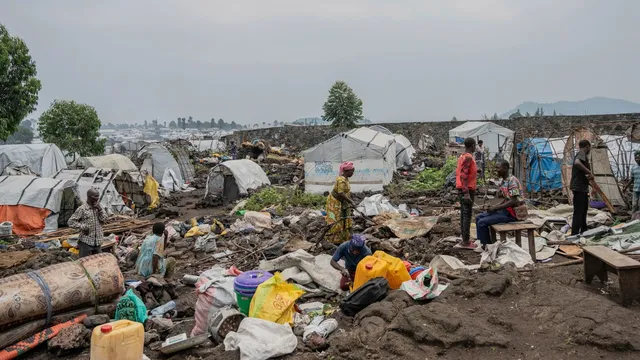
Militia fighters kill dozens in brutal Congo attack
2025-02-14 18:55- Militia fighters from CODECO attacked a camp for displaced people and surrounding villages in northeastern Congo.
- At least 55 civilians were killed in the assault, with the death toll expected to rise as bodies are retrieved.
- The ongoing violence in eastern Congo highlights a protracted conflict influenced by resource control and ethnic tensions.
Express your sentiment!
Insights
In northeastern Congo, an attack by militia fighters resulted in the deaths of at least 55 civilians, with local authorities reporting a likelihood that the death toll could rise as bodies continue to be recovered. This attack, which targeted a cluster of villages and a camp for displaced individuals in the Ituri province, was carried out by a group known as the Cooperative for the Development of Congo (CODECO), comprised mainly of fighters from the Lendu ethnic community. The violence, which has surged across the region, is deeply rooted in ongoing conflicts involving access to land and control of lucrative mineral resources. The situation in eastern Congo has been precarious for decades, with more than 120 armed groups contending for power and resources. Ituri has seen periodic escalations of violence, most notably where CODECO fighters have been implicated in numerous attacks against civilian populations, leading to significant casualties in the past. The current climate of instability intensified following the recent seizure of Goma, the capital of North Kivu province, by M23 rebels allegedly supported by Rwanda. This event has heightened fears of a broader conflict and prompted calls from African leaders for a ceasefire—calls that have not seemed to lead to any tangible peace efforts on the ground. Following the latest CODECO attack, there have been reports of intervention from U.N. peacekeeping forces and Congolese troops; however, they were reportedly overwhelmed by a greater number of attackers. Local officials confirmed the brutality of the assault, with many victims being displaced persons who faced lethal force from both machetes and firearms. The humanitarian crisis in the sector has reached alarming levels, hinting at growing needs for support, particularly for those affected by the violence. Internationally, there is an increasing demand for resolution to the conflict, as countries and organizations express concern over the potential for the situation to spiral into a regional war. The Congolese government has called for targeted sanctions against Rwanda, citing aspirations to exploit the rich natural resources in the DRC. Despite Kigali's denial of such intentions, insisting that their interventions seek to eliminate threats to their security, the complex web of violence, resource competition, and ethnic tensions continues to wreak havoc in eastern Congo.
Contexts
The impact of armed conflict on civilians in Congo has been profound and devastating, affecting every aspect of their lives. The ongoing violence has created a humanitarian crisis characterized by mass displacement, loss of life, and severe trauma. Civilians, particularly women and children, bear the brunt of these conflicts, becoming victims of violence, including sexual assault, forced recruitment into armed groups, and other human rights abuses. Access to basic necessities such as food, clean water, and medical care has been severely compromised, leading to malnutrition and the spread of preventable diseases. The socio-economic infrastructure is in shambles, with schools and hospitals being targeted or repurposed for military use, further exacerbating the plight of the civilian population. As a result, the educational and health systems are critically weakened, significantly hindering the prospects for recovery and development in the region. In regions like eastern Congo, where armed groups operate with impunity, the risk to civilians is particularly high. These conflicts have resulted in extensive displacement, with millions of people forced to flee their homes. Internally displaced persons (IDPs) often live in overcrowded camps or makeshift shelters with minimal access to healthcare and social services. The persistent insecurity makes it difficult for humanitarian organizations to deliver aid, leaving many vulnerable individuals without support. Furthermore, the prevailing culture of impunity for perpetrators of violence against civilians undermines efforts to restore peace and stability, as victims are often denied justice and redress. The psychological effects of armed conflict on civilians are long-lasting and can take generations to heal. Trauma, fear, and the loss of loved ones contribute to a mental health crisis that is frequently overlooked in humanitarian responses. Children, who are particularly susceptible to these impacts, face disrupted education and exposure to violence that can lead to long-term psychological challenges. The normalization of violence within communities can perpetuate cycles of conflict, making it difficult to foster a culture of peace and reconciliation. Addressing these psychological and emotional wounds is as vital as the immediate provision of humanitarian assistance and development aid. Efforts to mitigate the impact of armed conflict on civilians in Congo require a multi-faceted approach that includes not only immediate humanitarian relief but also long-term strategies for peacebuilding and development. Strengthening the rule of law, providing support to local governance structures, and promoting community-based reconciliation initiatives are essential for addressing the root causes of conflict. International support and commitment to ending violence and protecting civilians are crucial in creating an environment where recovery can take place. Only through comprehensive strategies that address both the immediate needs and underlying issues can the cycle of violence be broken, paving the way for a more stable and peaceful future for the people of Congo.